
Bengt Holmström, left, and Oliver Hart, right, share this year’s Nobel Prize in economics for their research on contract theory. Crédits: http://money.cnn.com/
Two professors from Harvard and MIT have been awarded the Nobel Prize in economics for contributions to contract theory — the agreements that shape business, finance and public policy.
Oliver Hart, 68, a British economist teaching at Harvard, and Bengt Holmström, 67, a Finnish economist teaching at MIT, were announced as the winners Monday by the Royal Academy of Sciences in Stockholm, Sweden.
«Contracts are essential to the functioning of modern societies,» the academy said in its announcement. «Hart’s and Holmström’s research sheds light on how contracts help us deal with conflicting interests.»
What they won for
Among the contracts they have studied is Holmström’s research on employment contracts, including between CEOs and shareholders.
«In economics we don’t really take a stand on the size of the bonus, though they seem extraordinarily high,» Holmström told reporters when asked about the multi-million-dollar bonuses paid to modern CEOs.
Hart’s research has looked at whether providers of public services, such as schools, hospitals, or prisons, should be publicly or privately owned. The research showed that «incentives for cost reduction are typically too strong,» the academy said. Privatizing those types of services can lead to a reduction in quality greater than the advantages of cost savings.
«Hart and his co-authors were particularly concerned about private prisons,» the academy said. «Federal authorities in the United States are in fact ending the use of private prisons, partly because — according to a recently released U.S. Department of Justice report — conditions in privately-run prisons are worse than those in publicly-run prisons.»
Who won in the past
Hart’s and Holmström’s is little-known outside of the world of economics. Some past winners have been more familiar to the general public.
Recent winners have included Robert Shiller, known for his work on bubbles in financial and real estate markets. His name is on a closely followed measure of U.S. home prices. He shared the award in 2013.
Another high-profile winner was Paul Krugman, a liberal columnist for The New York Times and a Princeton professor who won in 2008 for his work on trade patterns and location of economic activity.
Princeton University Professor Angus Deaton won the prize in 2015 for his work on poverty.
The Nobel prize in economics has been awarded since 1969.
